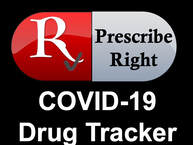|
COVID-19 Vaccines
The CDC and FDA are recommending a pause in the use of the J&J vaccine. The FDA, CDC and the EMA’s Pharmacovigilance Risk Assessment Committee (PRAC) are investigating six cases of cerebral venous sinus thrombosis in combination with thrombocytopenia that occurred in women between the ages of 18 to 48 with symptoms occurring 6 to 13 days after vaccination. The adverse event is very rare with only six reports after 6.8 million doses. The CDC’s Advisory Committee on Immunization Practices (ACIP) will review these cases and assess their potential significance. The FDA will review ACIP’s report. J&J’s vaccine patients should be advised to monitor for severe headache, abdominal pain, leg pain, or shortness of breath within three weeks after receiving the vaccine. If symptoms occur, the patient should contact their health care provider. Health Care providers are reminded to report adverse events from any COVID-19 vaccine to VAERS. The Director of the Chinese Center for Disease Control and Prevention said the current Chinese COVID-19 vaccines offer low protection against the coronavirus. He also praised the mRNA vaccines and said China is working on developing mRNA vaccines. Hundreds of millions of doses of Chinese vaccines have been distributed worldwide and 65 million Chinese citizens received at least one dose. A supply shortage of raw materials, such as bags used to grow cells, has delayed the production target for Novovax until 3Q21. COVID-19 Antibodies NIH recommends that either Casirivimab 1,200 mg plus Imdevimab 1,200 mg (Regeneron) or Bamlanivimab 700 mg plus Etesevimab 1,400 mg (Lilly) be used for the treatment of outpatients with mild to moderate COVID-19 who are at high risk of clinical progression. NIH recommends against the use of Bamlanivimab alone, due to resistance from variants, unless the combination products are not available. NIH also recommends against the use of any monoclonal antibodies in hospitalized patients unless they are part of a clinical trial. Regeneron announced that in a 29-day, 1,505 patient, NAID sponsored Phase III trial (NCT04452318), symptomatic COVID-19 developed in 1.5% of patients that received a single subcutaneous injection of REGEN-COV (casirivimab and imdevimab) 1,200 mg compared to 7.8% of patients that received placebo in COVID-19 negative patients exposed to a COVID-19 positive patient in the same household. In the same trial symptomatic COVID-19 developed in 29% of patients that received REGEN-COV compared to 42% of patients that received placebo in 204 asymptomatic COVID-19 positive patients that did not have anti-virus antibodies and had been exposed to a COVID-19 positive patient in the same household. COVID-19 Antivirals Gilead Sciences discontinued a 28-day, 1,264 patient, Phase III trial evaluating three intravenous infusions of remdesivir to reduce the development of COVID-19 (NCT04501952), related hospitalization or all-cause death in non-hospitalized COVID-19 patients. The trial was discontinued because the standard of care for outpatient COVID-19 had advanced beyond the need for a multi-day treatment that required administration by intravenous infusion, such as the single dose monoclonal antibodies. COVID-19 Anti-Inflammatories Interim data from the 2,422 patients enrolled in the 28-day, Phase III, PRINCIPLE trial, found that inhaled budesonide added to usual care decreased time to recovery by 3-days compared to usual care alone in outpatients with COVID-19. Comments are closed.
|
Stay informed, subscribe to the Prescribe Right Pharmaceutical Pipeline Tracker
Archives
January 2023
Categories |
Services |
Company |
Support |
© COPYRIGHT 2015. ALL RIGHTS RESERVED.
|


 RSS Feed
RSS Feed